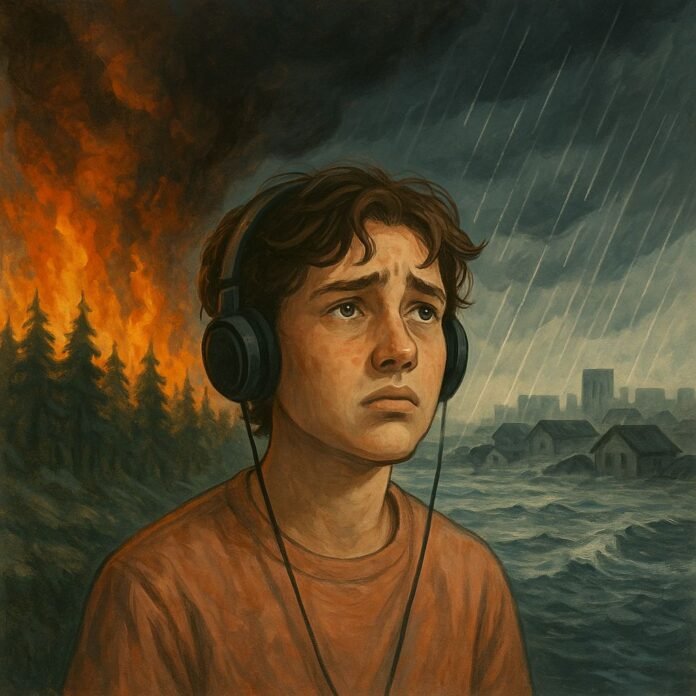Being a teenager today, the dystopia is not lost on you. As you scroll on TikTok, you see wildfires in one country, floods destroying another, and news headlines declaring that there is only a little time left until an irreversible climate catastrophe occurs. For many young people, this isn’t just news. It’s a part of their existence. It’s fear that resides in their hearts because they don’t know if they’re next.
This emotional weight has a name: Climate Anxiety. It is the chronic fear of environmental doom. And it dictates our future and our livelihoods. The choices made today determine how long we will survive. Because when mother nature revolts, the consequences are catastrophic.
“You have stolen my dreams and childhood with your empty words”
-Greta Thunberg
What is Climate Anxiety?
Climate anxiety isn’t simply worrying about the environment: it’s a persistent state of dread about the planet’s future. Unlike everyday stress, this fear stems from something much more enormous, something out of individual control. For young people who have grown up hearing about melting glaciers, rising sea levels, and witnessing floods, this isn’t just a hypothetical. It’s their reality.
A study published in The Lancet, in 2021, surveyed 10,000 young people across the globe aged 16-25. The findings displayed that 84% of people were worried about this growing crisis. They reported feeling sad, anxious, helpless, and guilty. For Gen-Z, the climate crisis isn’t some distant challenge; it’s their impending doom.
Why Youth Feels it Most:
The main issue is that unlike older generations, young people aren’t the direct cause of this crisis. They were born into an already deteriorating planet and have to live with the consequences. This unfairness often intensifies their anxiety.
Furthermore, social media keeps this crisis front and center. Every wildfire clip, every flooded street takes over their FYP and confronts them with the bitter reality of the future. There is a constant fear of being the next victim.
There is also uncertainty for the future. Plans that once seemed seamless have to be thought over a million times. Often times, couples who wish to have children refrain from this choice because future on this planet is uncertain.
Their hostility only grows more when the older generation blames climate disasters on the displeasure of God. It is felt by the youth that doing this decreases accountability for their actions that led to the current state of the planet. It also decreases accountability that large corporations have to face despite their active complicity in this crisis.
Lastly, when young activists do come out to speak against these atrocities happening to the planet, they are laughed at. An example of this is the speech Greta Thunberg gave at UN Climate Action Summit, which was met with malicious mockery online.
Coping With Climate Anxiety:
When the leaders of the world fail you, you have no choice but to take matters into your own hands. That is what Gen-Z is doing. With movements like Fridays for Future led by Greta Thunberg, show how collective action can turn despair into empowerment and fear into action. Protesting, Volunteering and Campaigning can turn anxiety into change.
In addition to this, online and offline support groups are growing where people can share their feelings and feel less apprehensive of what the future holds for them. Simply knowing that you are not alone in feeling anxious and scared helps ease the burden.
Even on an individual basis, Gen-Z is reducing their carbon footprint. From using paper straws, using public transport over cars, and advocating for renewable energy, they are doing their best to reduce the burden on nature. Although, one single person cannot solve climate change, individual choices reenforce the belief that efforts matter.
Why Listening Matters:
The most important step for leaders and older generations is to listen. Too often young voices are dismissed as ‘naïve’ or ‘alarmist’. But these remarks only deepen the frustration. Policy changes, Implementation of sustainable energy and climate education is extremely vital. Including the youth during policy making helps build trust and faith in the law making bodies.
Turning Fear Into Fuel:
Climate anxiety reflects a painful truth: this generation is growing up under threat. Yet, it also reflects care, awareness, and responsibility. Having climate anxiety means that there is a sense of empathy and concern for the planet.
The important thing is to ensure that this fear does not paralyze us but rather encourages us to move towards sustainability. If given the right tools and importance, this generation is capable of transforming their fear into the most powerful movement of change this world has ever seen.







